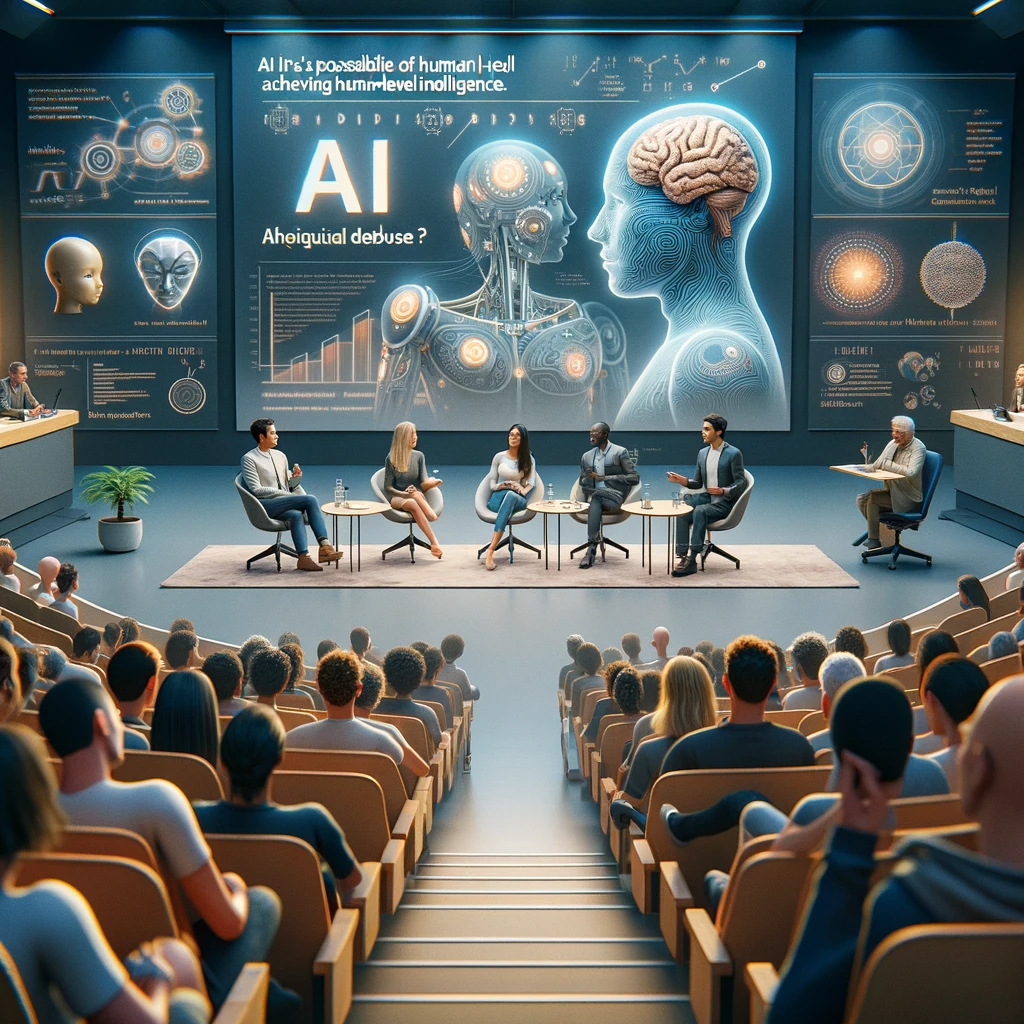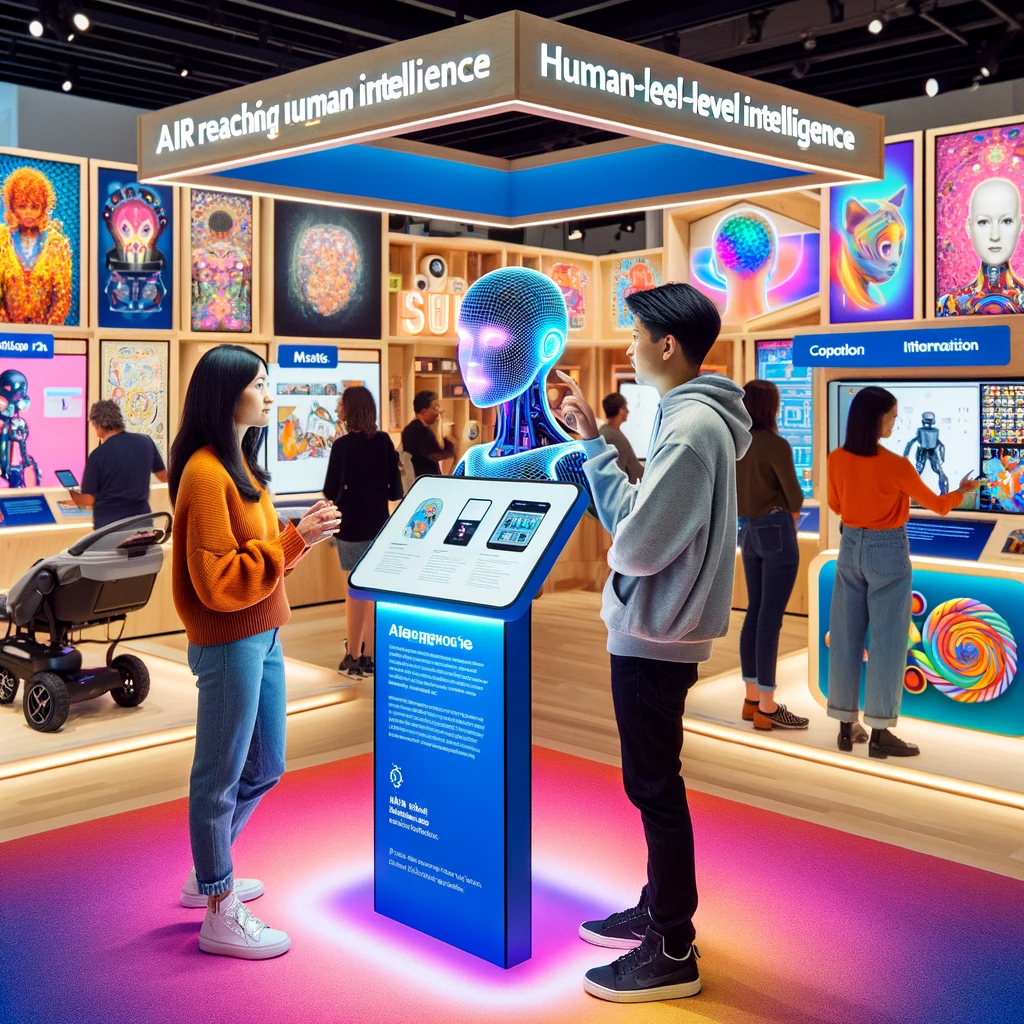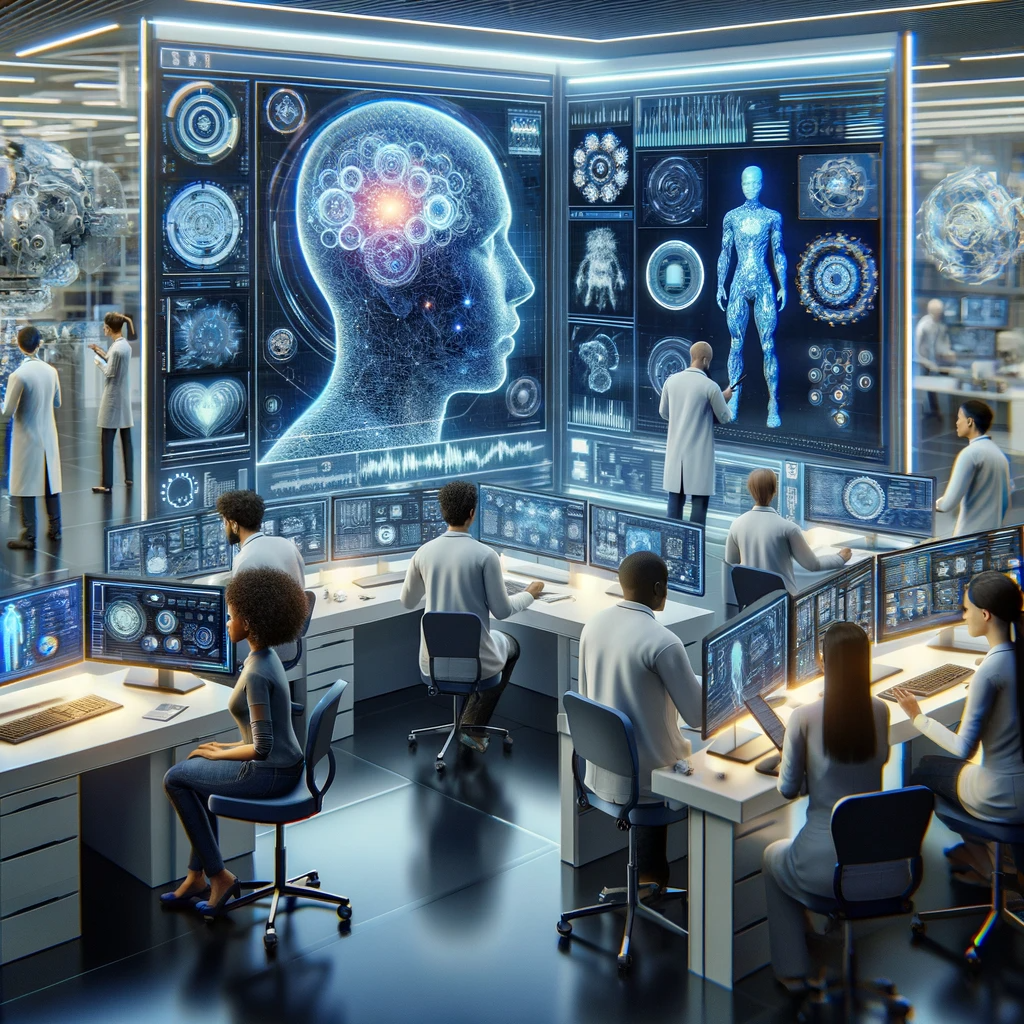Exploring the Quest for Artificial General Intelligence (AGI)
Artificial Intelligence (AI) has rapidly evolved in recent years, revolutionizing industries, automating tasks, and demonstrating remarkable capabilities in various domains. Yet, amid these advancements lies a profound question that has captivated the minds of scientists, researchers, and futurists alike: Can AI ever achieve human-level intelligence, or perhaps even surpass it? This question forms the core of discussions surrounding Artificial General Intelligence (AGI), a concept that represents the ultimate goal of AI research.
At its essence, AGI refers to AI systems that possess the ability to understand, learn, and adapt across a broad range of tasks and domains, mirroring the versatile intellect of humans. The pursuit of AGI has driven innovation in AI, and it holds the potential to reshape the future in ways both inspiring and daunting.
In this exploration, we embark on a journey into the heart of the AGI debate. We traverse the landscape of AI’s current capabilities, the challenges that loom on the path to AGI, and the ethical and societal considerations that arise as we push the boundaries of AI. The central question that guides our quest is profound: Will AI ever achieve human-level intelligence? To address this, we delve into the very essence of AGI, examining the challenges and possibilities that lie ahead and considering what the future may hold for humanity and intelligent machines. As we navigate this complex terrain, we seek not only answers but also a deeper understanding of the boundless potential and intriguing mysteries of artificial intelligence.

Understanding Artificial General Intelligence (AGI)
Artificial General Intelligence (AGI) represents the pinnacle of artificial intelligence research, distinct from narrow or specialized AI systems that excel in specific tasks or domains. While narrow AI excels in tasks like image recognition, natural language processing, and playing board games, AGI aims to replicate the versatility and adaptability of human intelligence across a wide range of tasks and domains.
At its core, AGI is characterized by its ability to understand, learn, and adapt in dynamic and unfamiliar environments. Unlike narrow AI, which is designed for specific functions, AGI systems possess the capacity to transfer knowledge and skills from one domain to another, akin to how humans can apply their learning from one area to solve problems in another.
The concept of AGI is not a recent development but has been a longstanding aspiration in the field of AI. Early pioneers like Alan Turing envisioned machines that could exhibit general intelligence, and this vision continues to drive AI research today. While progress has been remarkable, achieving AGI remains an elusive goal, primarily due to the complexity of human cognition.
In contemporary AI research, AGI serves as both an inspiration and a benchmark. Researchers strive to imbue AI systems with human-like adaptability and problem-solving capabilities, albeit with varying degrees of success. The pursuit of AGI has led to innovations in machine learning, reinforcement learning, and neural networks, bringing us closer to the goal of creating more intelligent machines.
As we explore the depths of AGI, we encounter not only the technical challenges but also the ethical and philosophical questions surrounding the potential emergence of machines with human-level intelligence. The quest for AGI raises profound questions about consciousness, creativity, and the relationship between humans and machines. While the road to AGI is long and challenging, the journey itself is a testament to humanity’s curiosity and the enduring quest to unravel the mysteries of intelligence.
The Current State of AI
The current state of Artificial Intelligence (AI) is characterized by remarkable achievements in various domains, showcasing its expanding capabilities. AI has made significant strides in areas such as natural language processing (NLP), computer vision, and gaming, showcasing its versatility and potential. However, it’s essential to recognize that AI, as of now, is far from achieving human-level intelligence, and it has its own set of limitations.
In the realm of natural language processing, AI-powered chatbots and virtual assistants have become an integral part of our daily lives. These systems can understand and generate human language, providing assistance in tasks ranging from answering questions to setting reminders. They have found applications in customer support, healthcare, and more, enhancing efficiency and accessibility.
Computer vision, another domain where AI excels, has enabled breakthroughs in image and video analysis. AI algorithms can now identify objects, recognize faces, and even analyze medical images with impressive accuracy. This capability has widespread applications, from autonomous vehicles to medical diagnostics, revolutionizing industries and saving lives.
In the world of gaming, AI has demonstrated its prowess by defeating human champions in complex games like chess, Go, and video games. These achievements showcase AI’s ability to learn and strategize, a crucial aspect of human intelligence. They also serve as a testament to AI’s adaptability and problem-solving skills.
However, it’s important to note that current AI systems have their limitations. They excel in specific domains but often lack common-sense reasoning and contextual understanding. AI models like GPT-3, while impressive, can produce plausible-sounding but incorrect or nonsensical answers when faced with questions that require a deeper understanding of context or background knowledge.
Moreover, AI’s capabilities are often confined to the data they are trained on. They might perform excellently within a predefined scope but struggle when faced with unfamiliar situations or tasks outside their training data. This limitation underscores the contrast between narrow or specialized AI and the broader aspirations of Artificial General Intelligence (AGI).
In conclusion, AI has made significant progress and achieved remarkable feats in various domains, making it a valuable tool in many industries. However, it is vital to understand that the current state of AI is characterized by specialized capabilities and limitations. The journey toward AGI, where machines possess human-like adaptability and common-sense reasoning, remains a challenging but tantalizing pursuit in the field of AI.
Challenges on the Path to AGI
The pursuit of Artificial General Intelligence (AGI), where machines attain human-level intelligence, is an ambitious endeavor fraught with multifaceted challenges. These challenges encompass technical, philosophical, ethical, and computational aspects, making the path to AGI both exciting and daunting.
One of the foremost technical challenges in AGI development is building AI systems that can generalize their knowledge and adapt to a wide range of tasks and situations. Current AI models often excel in narrow domains but struggle when confronted with unfamiliar tasks, lacking the robustness and versatility that characterize human intelligence. Researchers are actively exploring techniques to enhance AI’s adaptability, such as transfer learning and meta-learning, to enable them to apply knowledge from one domain to another.
AI safety and ethics represent another critical challenge. As AI systems become more capable, ensuring their responsible and ethical use becomes paramount. Issues related to bias and fairness in AI algorithms, as well as concerns about transparency and accountability, need to be addressed comprehensively. The ethical considerations surrounding AGI include questions about the potential consequences of creating highly intelligent machines and the rights and responsibilities associated with them.
Explainability is a crucial challenge in AGI development. As AI systems become more complex, understanding their decision-making processes becomes increasingly challenging. This lack of transparency raises concerns about AI’s reliability and the potential for biased or incorrect outcomes. Researchers are actively working on developing techniques to make AI systems more interpretable, ensuring that their decisions can be understood and scrutinized.
On the hardware front, AGI development requires immense computational power. Achieving human-level intelligence involves processing vast amounts of data and performing complex computations in real-time. The development of specialized hardware, such as neuromorphic chips and quantum computing, is being explored to meet the computational demands of AGI research.
Additionally, AGI development necessitates interdisciplinary collaboration between experts in various fields, including computer science, neuroscience, psychology, and philosophy. Understanding and replicating the intricate workings of the human brain, which is a source of inspiration for AGI, is a complex task that requires expertise from diverse domains.
The journey toward achieving Artificial General Intelligence is marked by a myriad of challenges, ranging from technical hurdles to ethical and philosophical considerations. Overcoming these challenges will require concerted efforts from researchers, policymakers, and society as a whole. While the path to AGI is challenging, the potential benefits in terms of solving complex problems and advancing human knowledge make it a worthy pursuit in the field of AI.

The Quest for Superintelligent AI
The concept of superintelligent AI, which surpasses human intelligence, has long been a subject of fascination, debate, and even trepidation. It represents the ultimate goal in the development of Artificial General Intelligence (AGI), and it raises profound questions about the future of AI and its potential impact on humanity.
Proponents of superintelligent AI argue that it is not only possible but also inevitable. They point to the exponential growth of AI capabilities, driven by advances in machine learning, neural networks, and computing power. They believe that as AI systems become increasingly sophisticated and capable of self-improvement, they will eventually exceed human cognitive abilities.
However, the prospect of superintelligent AI also raises significant concerns and has sparked considerable debate. Critics argue that achieving superintelligence may be far more challenging and uncertain than proponents suggest. They highlight the numerous technical, ethical, and philosophical challenges discussed earlier, such as AI safety, explainability, and hardware limitations. Some even question whether the human brain can be replicated or surpassed by AI, given its complexity and the mysteries that still surround consciousness and cognition.
The implications of superintelligent AI are profound and multifaceted. On the positive side, it holds the promise of solving complex problems and accelerating scientific discoveries in ways that were previously unimaginable. Superintelligent AI could contribute to advancements in medicine, climate modeling, and fundamental research.
However, the risks associated with superintelligence cannot be ignored. There are concerns about control and safety, as a superintelligent AI system could potentially act in ways that are contrary to human interests. Ensuring that such a system aligns with human values and objectives is a formidable challenge. The idea of an AI system that can outthink and outmaneuver human decision-making poses security and ethical dilemmas that demand careful consideration.
The quest for superintelligent AI represents the pinnacle of AI research, with proponents and critics offering contrasting views on its feasibility and implications. While the achievement of superintelligence is uncertain and laden with challenges, the exploration of this concept drives progress in AI and prompts crucial discussions about the ethical, philosophical, and societal dimensions of artificial intelligence. Whether superintelligent AI becomes a reality or not, the pursuit of it continues to shape the future of AI and our understanding of intelligence itself.
Prominent Approaches and Research
The quest for achieving Artificial General Intelligence (AGI) has spurred the emergence of numerous research projects, organizations, and collaborations dedicated to pushing the boundaries of AI. While AGI remains a complex and elusive goal, these endeavors have led to remarkable breakthroughs and innovations in the field.
One prominent approach in AGI research is the development of neural networks and deep learning techniques. Deep learning models, such as convolutional neural networks (CNNs) and recurrent neural networks (RNNs), have achieved remarkable success in tasks like image recognition, natural language processing, and game playing. Research organizations like OpenAI and DeepMind have played pivotal roles in advancing deep learning and applying it to AGI-related challenges.
OpenAI, founded with the mission of ensuring that artificial general intelligence benefits all of humanity, has been at the forefront of AGI research. They have developed cutting-edge models like GPT-3, which demonstrates impressive language understanding and generation capabilities. OpenAI’s commitment to transparency and responsible AI development sets a standard for ethical AGI research.
DeepMind, acquired by Google, is known for its pioneering work in reinforcement learning and neural network architectures. Their AlphaGo program made headlines by defeating human champions in the complex game of Go, showcasing the potential of AI to excel in intricate domains. DeepMind’s ongoing research continues to explore the frontiers of AGI, particularly in healthcare applications.
Collaborations among research institutions, universities, and technology companies have also propelled AGI research. Partnerships like the Partnership on AI (PAI) bring together leading organizations to address global challenges in AI, including those related to AGI ethics and safety. PAI focuses on fostering cooperation and responsible AI practices.
Additionally, initiatives like the AI Alignment Podcast and the Future of Life Institute aim to promote discussions on AGI safety and ethics, involving experts and researchers from diverse fields. These platforms facilitate the exchange of ideas and insights crucial for ensuring that AGI development remains aligned with human values and interests.
AGI research is a dynamic and collaborative endeavor that has witnessed significant progress in recent years. Breakthroughs in neural networks, reinforcement learning, and ethical considerations have driven the field forward. Organizations like OpenAI and DeepMind, along with collaborative efforts such as PAI, are contributing to the global pursuit of AGI. While the journey toward AGI is complex and fraught with challenges, these research initiatives are crucial in shaping the future of AI and its potential to achieve human-level intelligence.
Ethical and Societal Considerations
As the pursuit of Artificial General Intelligence (AGI) continues to advance, it raises profound ethical and societal questions that demand careful consideration. The potential implications of AGI extend beyond technical challenges and touch upon fundamental issues of human rights, responsibilities, and the impact on society.
One of the central ethical concerns in AGI development revolves around the rights and responsibilities associated with highly intelligent machines. As AGI systems approach or surpass human-level intelligence, questions emerge regarding their moral standing and rights. Should AGI entities have rights, and if so, what are their responsibilities towards humanity? These questions challenge our understanding of personhood and ethics.
Societal concerns related to AGI are multifaceted. The fear of widespread job displacement due to automation and AI is a prominent issue. As AGI systems become increasingly capable, there is a legitimate concern that they could replace human workers across various industries. Addressing this concern requires proactive measures, such as reskilling and upskilling programs, to prepare the workforce for an AI-driven future.
Privacy and security also loom large on the ethical landscape of AGI. The capabilities of AGI to process vast amounts of data raise concerns about the potential misuse of personal information and surveillance. Ensuring robust privacy protections and security measures becomes crucial to prevent unauthorized access and data breaches.
Efforts to address these ethical and societal challenges are already underway. Organizations like the Future of Life Institute and the Center for Human-Compatible AI are dedicated to promoting AGI safety, ethics, and alignment with human values. These institutions facilitate research, discussions, and collaborations aimed at ensuring AGI development adheres to ethical principles.
Additionally, the creation of AI ethics boards and advisory committees within research organizations, such as OpenAI’s Safety and Policy team, reflects a commitment to responsible AGI development. These bodies play a critical role in guiding the ethical decision-making process and ensuring AGI benefits all of humanity.
In conclusion, the ethical and societal considerations surrounding AGI are complex and multifaceted. They require ongoing dialogue, collaboration, and proactive measures to address challenges related to rights, responsibilities, job displacement, privacy, and security. While AGI holds immense promise, it is imperative that its development is guided by a strong ethical framework and a commitment to the well-being of society as a whole.
The Future of AGI
The future of Artificial General Intelligence (AGI) is a subject of both fascination and speculation. While the development of AGI is a complex and challenging endeavor, it continues to captivate the imagination of scientists, researchers, and the public alike.
Predicting precise timelines for achieving AGI remains elusive. Some experts believe that AGI could be achieved within the next few decades, while others suggest a longer timeline. The variability in these predictions reflects the intricate nature of AGI development and the numerous technical, ethical, and societal considerations that must be addressed.
One possible scenario for the future of AGI is its coexistence with human intelligence. In this scenario, AGI systems would work alongside humans in various capacities, augmenting our capabilities, and assisting with complex problem-solving tasks. This cooperative approach envisions AGI as a tool that complements human skills rather than replaces them, fostering a symbiotic relationship between humans and machines.
Another scenario, which has garnered significant attention, is the possibility of AGI surpassing human intelligence—commonly referred to as superintelligent AGI. This scenario raises profound questions about the implications of creating entities that are vastly more intelligent than humans. While superintelligent AGI could bring about transformative advancements in science, technology, and society, it also presents inherent risks and challenges.
The key challenge in achieving AGI lies in ensuring its alignment with human values, ethics, and safety. Developing AGI that shares our goals and behaves ethically is of paramount importance. Researchers and organizations are actively working on the concept of value alignment, which aims to instill AGI with values that are compatible with those of humanity.
The future of AGI will be shaped by collaborative efforts across research institutions, governments, and the private sector. OpenAI’s mission, for example, is to ensure that AGI benefits all of humanity, and it actively seeks to promote cooperative research and collaboration in AGI development.
The future of AGI is a complex and multifaceted landscape that encompasses various scenarios, challenges, and possibilities. While the timeline for achieving AGI remains uncertain, the pursuit of ethical, safe, and value-aligned AGI is crucial to realizing its potential benefits while mitigating risks. As AGI research advances, it will continue to reshape our understanding of intelligence and its role in society.
The Impact on Humanity
The potential impact of Artificial General Intelligence (AGI) on humanity is profound, with both exciting opportunities and significant risks on the horizon. As AGI development progresses, its effects are expected to ripple through various sectors, reshaping industries, healthcare, education, and more.
One of the most promising aspects of AGI lies in its transformative potential across industries. AGI-powered systems have the capacity to revolutionize manufacturing, logistics, finance, and numerous other sectors by optimizing processes, automating tasks, and improving decision-making. This could lead to increased efficiency, cost savings, and innovations that were previously unimaginable.
In healthcare, AGI has the potential to accelerate medical research, diagnosis, and treatment. AGI-powered algorithms can analyze vast datasets of medical information, identify patterns, and suggest tailored treatment plans, ultimately enhancing patient care and outcomes. Drug discovery, genomics, and personalized medicine are areas that stand to benefit significantly from AGI advancements.
In education, AGI can revolutionize the way students learn. Adaptive learning platforms powered by AGI can provide personalized educational experiences, catering to individual learning styles and pacing. This could democratize education by making high-quality learning resources accessible to a global audience.
However, with these opportunities come ethical and societal considerations. Responsible AGI development is of paramount importance to ensure that the benefits are widespread and that AGI aligns with human values and interests. AGI must be designed to prioritize safety, transparency, and ethical decision-making.
One of the primary concerns is the potential for job displacement. While AGI can create new career opportunities, it may also automate certain jobs, raising questions about the future of work and the need for upskilling and reskilling programs. Preparing the workforce for the changes brought about by AGI is a critical task for governments and organizations.
Additionally, AGI’s impact on society extends to issues of privacy, security, and accountability. AGI systems will have access to vast amounts of data, necessitating robust data protection measures and regulations. Ensuring that AGI systems are transparent, explainable, and accountable for their decisions is essential to building trust among users.
In conclusion, AGI holds the promise of transforming industries, improving healthcare and education, and driving innovation. However, realizing these benefits requires responsible development that addresses ethical, societal, and economic challenges. The impact of AGI on humanity will depend on our ability to harness its potential while safeguarding against risks.

Conclusion
In the pursuit of Artificial General Intelligence (AGI), we have embarked on a journey filled with remarkable achievements and complex challenges. The central question that has guided our exploration throughout this article is whether AI will ever achieve human-level intelligence. While we have witnessed astonishing progress in AI capabilities, the path to AGI remains uncertain.
Artificial General Intelligence, characterized by adaptability, learning, and problem-solving abilities on par with human intelligence, holds the promise of revolutionizing industries, healthcare, education, and more. It embodies the aspiration to create machines that can understand, reason, and interact with the world in ways that mimic human cognition.
Throughout this article, we have delved into the nuances of AGI, its current state, technical and philosophical challenges, ethical considerations, and societal implications. We’ve explored the potential for AGI to coexist with or surpass human intelligence, acknowledging the opportunities and risks it presents to humanity.
As we navigate this uncharted territory, it is clear that AGI’s impact on humanity will be profound. It is incumbent upon us to approach this quest with caution, responsibility, and a commitment to ethical principles. The development of AGI should prioritize transparency, accountability, and alignment with human values.
Moreover, the journey to AGI is not the work of isolated individuals or organizations but a collaborative endeavor that transcends borders and disciplines. International cooperation, interdisciplinary research, and public engagement are essential to ensuring that AGI benefits all of humanity.
In conclusion, the question of whether AI will ever achieve human-level intelligence remains open, and the pursuit of AGI continues. What is certain is that the quest for AGI must be marked by unwavering dedication to ethical AI, a commitment to addressing challenges, and a collective effort to shape a future where AGI enhances our lives responsibly and harmoniously.
